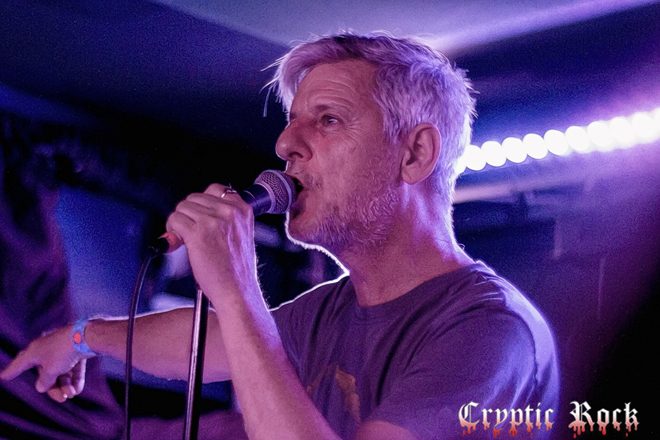
Come together back in 1979, within three years, the band went from being an underground favorite to international superstars thanks to the mega success of “I Melt with You.” A song that everyone knows and loves, the story of Modern English is much more grand than just a single. Producing genre standout albums such as 1981’s Mesh & Lace and 1982’s After the Snow, Modern English keep their legacy going strong with their 2017 album, Take Me to the Trees. Their first record with the original lineup in over three decades, Take Me to the Trees has been met with positive acclaim, but most of all, shows a band with plenty of creativity left to offer. Recently we caught up with Singer-Songwriter Robbie Grey to talk about the history of Modern English, their story behind the new album, the magic of the New Wave movement, and much more.
CrypticRock.com – With a history that dates back nearly four decades, Modern English broke onto the UK scene in the early 80s, becoming an underground favorite before the international mainstream success to follow. First, tell us, what has the incredible journey of the band been like?
Robbie Grey – It has been a bit of a ride I must admit. Since we got back together, it becomes even more apparent what a wild ride it was. We were really an underground band, we used to play to a couple hundred people in art galleries and underground clubs. Even before that, we were so poor we used to go steal instruments from other people’s shows just to get started. We would go to see DJs and steal their microphones at night, that was the starting point. Fast forward to “I Melt with You,” one of the biggest videos on MTV that year, now even on YouTube, we are talking about 20 million views of the original video, it’s pretty incredible really because we were and still are a bunch of working class guys who do very well for themselves.
This last year, we did a Caribbean cruise where we played with some other bands and went around to these amazing islands. We’ve been to the Philippines on tour, and had an amazing time there. Now we recorded a new album, Take Me to the Trees. Recently we played at the 100 club in London, which is the famous venue where The Beatles, The Stones, Paul McCartney played solo, and the Sex Pistols, you name it, everybody had played there. Not only has it been a ride, but it’s been a very broadening experience for everybody.
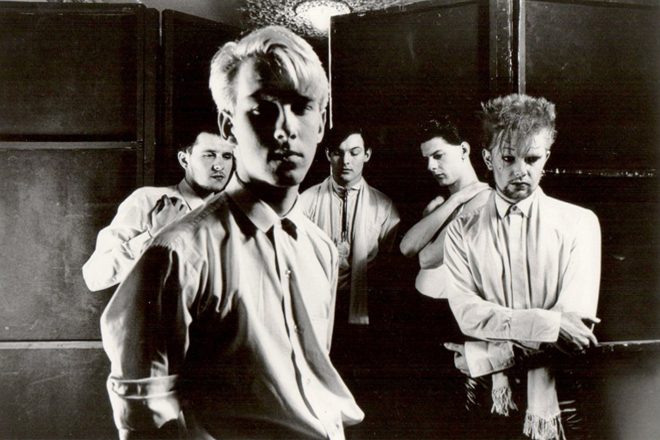
Robbie Grey – As the Punk scene changed into the Post-Punk sound, which was bands like Joy Division, Wire, Gang of Four, The Cure, Depeche Mode, all these bands, and we were one of those bands, that was the sound of bands really starting to experiment. We used effects pedals on guitars, used crazy synth sounds, really that’s bands finding their feet after the Punk Rock thing moving into the Post-Punk thing. That was what Mesh & Lace was. We produced it ourselves, we recorded it very quickly over a two week period with Watts Russell of 4AD records in the studio with us. We also had Keith Thomas, he was a member of Throbbing Gristle, he was doing the engineering and co-production. There was a wild bunch of brains in there and that comes across on Mesh & Lace.
It’s all not so dark, but experimental. Then you shift forward to the next year, and we decided to use a proper producer; someone who would bring something to the table. Hugh Jones came to see us live, he had done things like the Teardrop Explodes, Echo & the Bunnymen, you name it, he had been doing it. We got on very well with him. He brought the art of songwriting to the table, which we weren’t very good at. We used to take pieces of music and glue them together and call them pieces, which is why things like the Mesh & Lace album are not completely song structures – they are more like pieces that were experimental. He brought the traditional craft of songwriting to the table. Also, for me, he said, “You don’t need to shout all the time, just talk into the microphone.” Which is why “I Melt with You” has got a very interesting verse to it. It’s the first time that I didn’t shout on a record. That was an interesting thing he brought to my table along with the use of acoustic guitars, flutes, etc. More than anything, it was song arrangements, he showed us how to write songs in a traditional format.
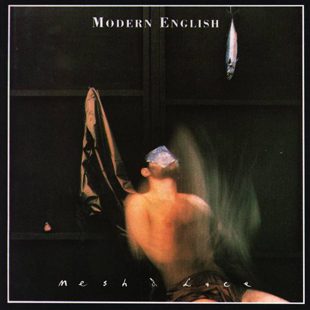
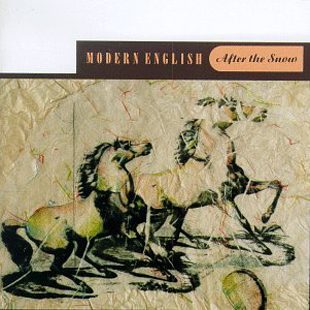
CrypticRock.com – Right, well, they are both magnificent records in their own right. You mentioned “I Melt with You,” the single broke into massive success in 1982. The song remains to be very popular to this day. That said, were you at all surprised, and are you still surprised, at how much people adore this track?
Robbie Grey – Absolutely, it was just another song on our album at the time. We knew it was a Pop song kind of thing., but we were making an album, we weren’t just concentrating on “I Melt with You.” We were in the studio and I remember there was a phone call made from America and they said the album is on import and someone had picked up on “I Melt with You” and started playing it on import, I don’t think this had ever happened before. It was like wildfire, it just went across all the different radio stations in America.
We didn’t know what to expect, when we arrived at spring break one year in the early ’80s in Daytona Beach, Fl, we were wearing long coats when we got off the plane, that’s how little we knew about America. It was bloody warm and we were wearing coats! When we got to the venue, the guy said, “Look, there’s a chance there could be 10,000 people there tonight” and we were like, “What are you talking about?” We were used to playing to 200 people in England. He said, “If you play outside tonight there will be more than 5,000 people, if you play inside we can cram 5,000 people in.” We had never played outdoors before. Being scared of that, we said, “Let’s play indoors.” That night, when we played “I Melt with You,” everybody knew all the words. They were singing the words, we had never had anything like that before. Other countries like the Philippines, Germany, France, etc., when we played the 100 Club, even the English were singing it! It is very unusual for the English to let go like that.
If you ask me why I think that song has lasted so long, and is liked by so many people, I think the words are one reason. It’s a love song, even though it’s a twisted love song. I think the feel of the song sort of glides – the acoustic guitars just propel it forward. That’s what the enduring quality of it really is.
CrypticRock.com – Yes, it does have a special sound to it as far as the single itself. What is also interesting about that particular track is it was one of the first times a film actually let a song play out in its entirety. In 1983’s Valley Girl, the song plays out within the film.
Robbie Grey – I think it was in that film three times, but I know the scene you mean – it’s when they are riding horses on the beach and all that sort of stuff and they play it all the way through.. Yeah, that was pretty incredible to see that, it was Nicolas Cage’s breakthrough movie as well, wasn’t it?
CrypticRock.com – Yes, absolutely. You have always seen music used in movies, but it was almost like a music video in the movie, it was unbelievable.
Robbie Grey – Now that I think about it, they do it all the time now, don’t they? So it’s been a groundbreaker in that way.
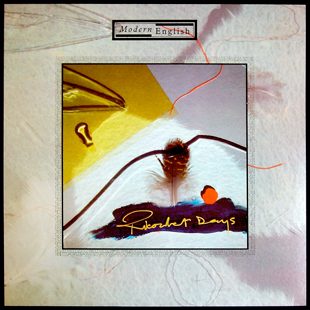
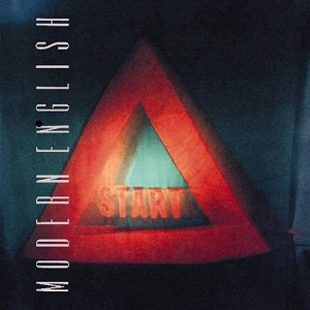
CrypticRock.com – It certainly was. Following 1990’s Pillow Lips, there was a bit of a long gap before Modern English returned. Now the band has reunited and released the exciting new album Take Me to the Trees in February. It is a very fun listen, what was the writing and recording process like for this new record?
Robbie Grey – It was the first album since the ’80s with all of the original members except for the drummer, he couldn’t do it. It’s got the feel of the Mesh & Lace/After the Snow period, because it’s all the original members. The writing of it we did in sessions, we did a lot of jamming in the rehearsal room and then taping like we always used to do. We took segments of music, which if we liked certain parts, I’d take them away and try some melodies, vocals, and lyrics. Then we started using the Logic program as well to write where Mick Conroy would do a little bass line with the drum machine on his phone, and send me the file. We had never done that kind of thing before. “It Don’t Seem Right” and “I Feel Small” were written like that. Mick wrote the guitar part on “I Feel Small” and then the keyboard line on “It Don’t Seem Right.” I just crooned away in my front room, sent that back to him, he liked it, and we decided it would be a song to use. It was very various sorts of songwriting really.
CrypticRock.com – The end result came out very well. This record was finished for a little while though and you had a crowd funder which allowed you to release it to the people who donated first, correct?
Robbie Grey – Yeah, it was done through PledgeMusic. The response was incredible. We got everything we needed and more, those people obviously received the first versions of everything. We’ve got colored vinyl and the original albums, we have CDs, downloads, t-shirts, you name it. People have bought the chance to come play with us on stage, somebody paid to take me out to dinner. All these different things you can do these days through crowdfunding, which is because mainstream music is so boring, record companies don’t want to take any risks, everything is so homogenized. People are even moving away from even bothering with the record companies, it’s all done by the fans themselves and that’s been incredible.
Take Me To The Trees, which has been produced by Martin Young, who wrote “Pump Up the Volume” and was involved on Colorbox on 4AD, he brought a lot to the table with the album as well. He helped us musically, he’s more proficient musically than we are. He understood that each member of the band was really important for the sound like Gary’s effects on his guitar, Steve’s analog keyboards. That’s why I think the album sounds a lot like our earlier material because the producer understood that’s what we are best at.
CrypticRock.com – Yes, and Take Me to the Trees certainly touches on all the signature qualities that make up Modern English dating back to the early years. The guitar and keyboard sounds are all there, most of all, it is a cohesive album. What was it like going back into the studio with this original lineup to put this all today.
Robbie Grey – It was fantastic, I think, cause we are older. We’ve all known each other since we were teenagers in a small town an hour from London called Colchester, Essex; that’s where we came from, that’s our background. We’ve known each other from going to football matches, the pubs, etc. Getting back together was quite easy as people. The chemistry was still there, that’s the funny thing. When we walked into the rehearsal room for the first time and started playing our instruments, we just started laughing, because it sounded great.
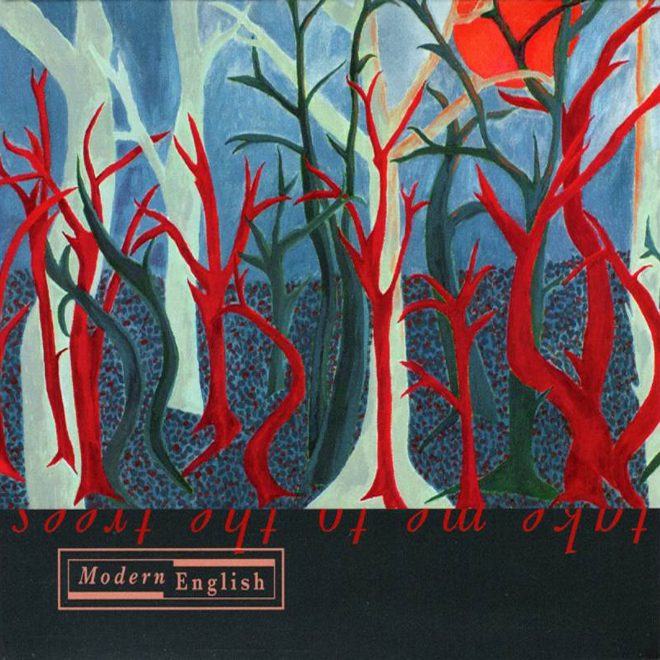
CrypticRock.com – It really did come out with a great end result. The record has officially been out now for fans to purchase. Being in the thick of the New Wave/Post-Punk scene that took the world by storm in the early ’80s, looking back, what do you think made the era so unique and magical that people still find inspiration from it all these years later?
Robbie Grey – I think it’s the time, there was a lot more freedom at that time. Things aren’t so free anymore, you are not allowed to do as much and can’t be as crazy like you used to be. People frown on that sort of thing these days really. It was really exciting to come out then. I remember sitting in my front room, we had David Bowie and Roxy Music when I was growing up in the ’70s and that was amazing. Bowie lit up the room in his colorful “Jean Genie” and everything, but then the Sex Pistols came along. Everybody in England just went, “Wow this is amazing,” It just shifted the whole thing, Prog Rock was really big before that with bands like Yes and Genesis. It shifted, everything changed after the Pistols and The Clash, and that was so exciting. Everybody I knew at the time just kind of went, “Wow this is what we need, we want this.” There was a whole movement of young people that just ran towards this stuff and that’s why it was really important. It gave people like Modern English a chance to pick up guitars and write about things they cared about lyrically, which they never would have done before.
CrypticRock.com – Yes, you are right, there is something unique about the time, that is why people still really love the music from the era. Interestingly enough, you speak of the sounds of the New Wave/Post-Punk movement, the synthesizers and the guitar tones, they have sort of come back in recent years with a lot of young bands. It is quite interesting because the ’90s went towards the Grunge Rock movement for a while, and now we see the New Romantic style coming back. What do you think has inspired this movement?
Robbie Grey – I really don’t know. I was talking about it one night recently on stage. In between the sound check and the gig, I walked down Wardour Street, which is a part of Soho, London, and I saw a shop called Underground. There was all black stuff, clothes and interesting stuff in there. There was a big poster and on it had Post-Punk, a massive poster, the size of the window. It tried to explain to me or anyone looking at it what Post-Punk meant. I just thought, this is incredible, it is such a big thing all over the world. I am an old man now, you would have to ask some of these young kids. I was interviewed by two twenty year old kids while in London. I tried to ask them what they thought was so interesting about Post-Punk, they said it’s about the lyrics and not having to conform to a sound of music. That is what a lot of younger bands seem to be doing up until a couple of years ago when this Post-Punk thing really took off.
CrypticRock.com – It is interesting when you look at the evolution of Rock-n-Roll from Punk into Post-Punk into New Wave. If you look at the New Wave/Post-Punk era, it really was the original Alternative Rock. It was the alternative to what other people were doing. There were really no rules, it could be synthesizers, it could be guitars, it could be heavy, it could be soft, it was quite varied.
Robbie Grey – Yes, it was a really exciting time to be involved in music. All these record labels popped up in England, like 4AD, Mute Records, Factory Records who had Joy Division and New Order then. Everything was happening. What helps over in the USA with music is the size of the country. If something happens in Manchester, you can find out about it, whereas in America, things are more spread out, even though you’ve got the internet now. Things were like wildfire back then. When you heard Joy Division’s new record you went crazy, you heard Depeche Mode’s new record, everyone was going out and buying these things just as soon as they came out. It was a really amazing time to be involved in music, I’m not sure whether the new Post-Punk thing will ever capture that. It’s that time really, they might take some influences from the music, but it was more about the time that it was happening in than anything else.
CrypticRock.com – Very true. It is great to see bands influenced, but you also don’t want it to be a derivative of the past, you cannot really recapture an era. That said, are there any new bands that you find interesting?
Robbie Grey – I am not really the person to ask. I don’t really, completely, and madly listen to music anymore. The last bands that I really liked are the Icelandic band Sigur Ros. I also quite like the Fleeting Foxes when their stuff came out. I haven’t kept up with stuff and have been busy with my own music.
CrypticRock.com – Quite understandable. My last question for you is pertaining to movies. CrypticRock.com covers music and Horror/Sci-Fi films. If you are a fan of these genres, what are some of your favorite films?
Robbie Grey – I am not a nerd for Horror of Sci-Fi, but I prefer Horror films to Sci-Fi. My favorite Horror film is The Exorcist (1973). A brilliant film before there were blue screens. That whole film is done with effects in that room. They made that room frozen so the actors would feel cold going in the room when she was possessed. I can’t really watch it very often, it’s too scary (laughs). I love George Romero’s films, they are really good, they are original. I quite like some of the zombie stuff happening recently, but god almighty, there are so many of them now. It is the same as music, it is like they say, “Ok, let’s do 1,000 zombie films.”
CrypticRock.com – Yes, it becomes very oversaturated. Isn’t that the way of the entertainment industry? There is one successful piece and they continue to capitalize on that, re-producing it over and over until they kill it.
Robbie Grey – Which is why you get street level on its stuff, which on its own, becomes more important. I love film, if there is one thing I would really like to do is put some music to a movie. We had I Melt with You the movie that came out a couple of years ago with Rob Lowe and Jeremy Piven. That was quite exciting because it was based on La Grande Bouffe (1973), which is a French film about guys who eat themselves to death – they just go to a castle just eat food and all die. We did a slow version, a kind of weird version of “I Melt with You” for that so that was really good fun, I’d love to do that again. I watch a movie every night with my wife, we love watching movies.
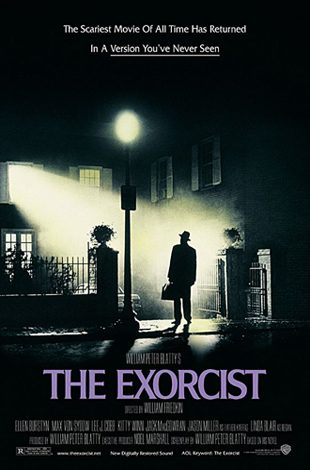
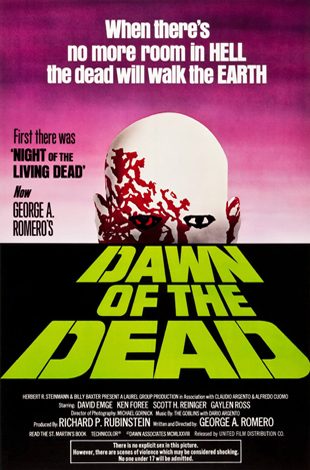
Modern English was set to return to North American for a spring 2017 tour, but due to Gary McDowell’s need for urgent care, the dates were postponed. Gary is currently recovering from surgery and the band looks to reschedule the tour as soon as possible. Stay tuned.
For more on Modern English: modernenglish.me | Facebook | Twitter
Purchase Take me to the Trees: Amazon | iTunes
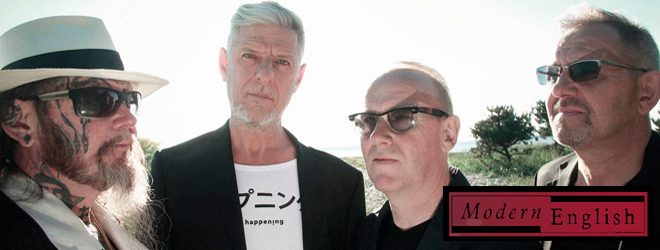
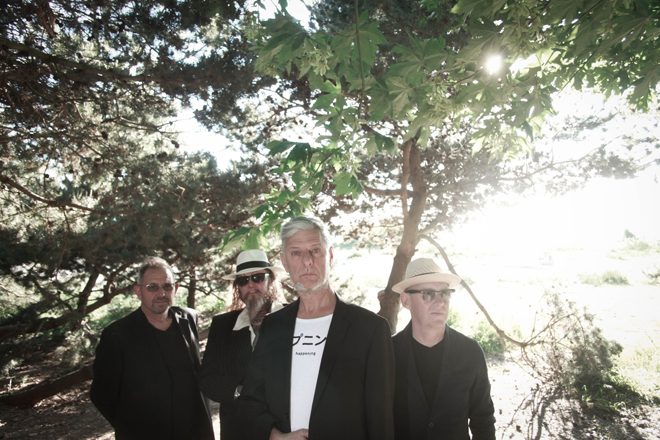
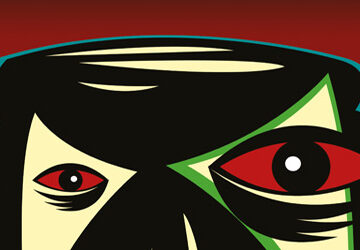
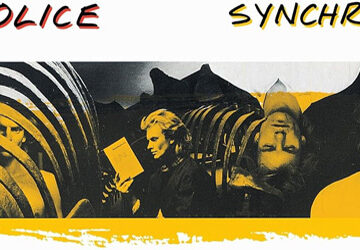
No comment